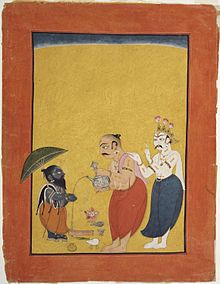
Back Mahabali BCL মহাবলী (দৈত্য রাজা) Bengali/Bangla Bali (rei mitològic) Catalan Bali (Asura) German Bali (rey mitológico) Spanish ماهابالی Persian Bali (démon) French राजा बलि Hindi Mahabali ID マハーバリ Japanese
| Mahabali | |
|---|---|
| Member of Chiranjivi | |
 Mahabali serves Vamana, while a suspicious Shukra tries to stop him. Painting from Mankot, Jammu and Kashmir, c. 1700-25 | |
| Affiliation | Daitya, Asura |
| Personal information | |
| Parents | Virochana (father), Vishalakshi (mother) |
| Spouse | Vindhyavali[a] |
| Children | Banasura, Namasu, Ratanamala, and Vajrajvala |
Mahabali (IAST: Mahābalī), also known as Bali, Indrasenan, or Māveli, is a daitya king featured in Hinduism. He is the grandson of Prahlada, and a descendant of the sage Kashyapa. There are many versions of his legend, in ancient texts such as the Shatapatha Brahmana, Ramayana, Mahabharata, and several Puranas. According to Hindu literature, he was blessed to be one of the Chiranjivi, a group of seven immortals, by the Vamana avatar of Vishnu and reigns in the Sutaloka.[2][3][4]
It is believed that Mahabali will become the King of Svarga (heaven) in the next yuga. In Kerala, Mahabali is considered to be the noblest and most prosperous ruler, who transformed his kingdom into a heavenly place. His legend is a major part of the annual festival Onam in the state of Kerala, and it is celebrated in Maharashtra, Karnataka, Gujarat, Telangana, Andhra Pradesh as Balipratipada, Balipadyami, or Bali padva (the third day of Deepavali and first day of Kartika month).[5][2][6][7]
- ^ Cite error: The named reference
Dalal2010p229was invoked but never defined (see the help page). - ^ a b Cite error: The named reference
kanev5was invoked but never defined (see the help page). - ^ Nanditha Kirshna (2009). Book of Vishnu. Penguin Books. pp. 58–59. ISBN 978-81-8475-865-8.
- ^ Narayan, R.K (1977). "Mahabali story". The Ramayana: a shortened modern prose version of the Indian epic. Penguin Classics. pp. 14–16. ISBN 978-0-14-018700-7.
- ^ "Bali Puja 2020 date: Bali Pratipada story and significance". The Times of India. 15 November 2020. ISSN 0971-8257. Retrieved 2 September 2023.
- ^ Cite error: The named reference
Melton2011p634was invoked but never defined (see the help page). - ^ "Diwali Padwa, Bali Pratipada: See significance and date". The Economic Times. 27 October 2022. ISSN 0013-0389. Retrieved 2 September 2023.
Cite error: There are <ref group=lower-alpha> tags or {{efn}} templates on this page, but the references will not show without a {{reflist|group=lower-alpha}} template or {{notelist}} template (see the help page).